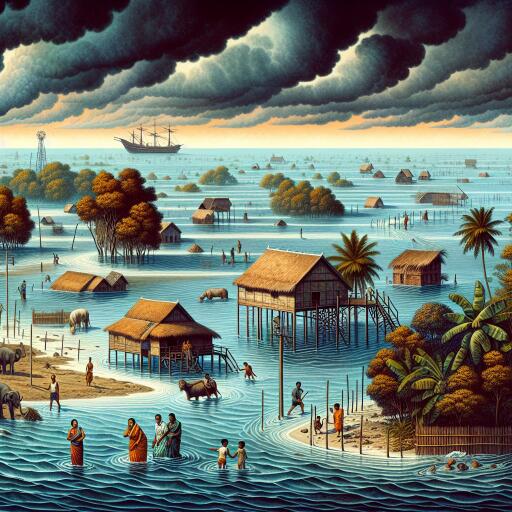
Sea Levels Consume Bangladesh Land at Alarming Speeds
In 2007, a devastation ripped through the life of Abdul Aziz, a Bangladeshi fisherman, when a cyclone destroyed his seaside home. With hopes of safety, Aziz moved inland, only to witness the sea engulf his previous dwelling the following year. Now, at the age of 75, Aziz’s fishing spot sits above the waters that swallowed his home, a distressing testament to his new reality. Living behind a simple barrier meant to hold back the sea, he watches as it inches closer each day, merging his once fertile land with the advancing ocean depths.
Bangladesh, a country cradled by vast rivers and the sprawling Bengal delta, finds itself on the frontline of climate-induced sea level rise. Scientists from the national government illustrate a picture of urgency, revealing that the coastlines are succumbing to the sea at rates surpassing global averages by more than 60%. Over a million coastal inhabitants are projected to be displaced in the coming decades, a movement forced by the relentless creep of the ocean, fueled by climate change.
The susceptibility of Bangladesh to climate impacts cannot be overstated. Abdul Hamid, a leading environmental expert in the country, emphasizes the multifaceted threats posed by the changing climate. Research, combining decades of satellite data, underscores an unsettling trend: sea levels along Bangladesh’s coast are climbing between 4.2 and 5.8 millimeters annually, outpacing the global average significantly.
Residents along the embattled coastline bare witness to the tangible effects of this rise. They recount tales of destructive waves that not only eat away at the land but salinate the soil and freshwater sources, devastating agriculture and local livelihoods. Cyclones, ever more frequent and severe due to the warming climate, exacerbate these challenges, leaving behind a trail of loss and dislocation.
Shahjalal Mia, a local businessman, voices a common fear among the coastal communities as he observes the gradual but steady loss of land to the sea each year. The increasing strength and frequency of cyclones, coupled with unbearable heatwaves, underscore a harsh reality. For many, the climate crisis is no longer a distant threat but an immediate danger to their survival and way of life.
Bangladesh’s plight is a stark reminder of the broader global challenge posed by climate change. Ainun Nishat, a climate expert at Brac University, points out the disproportionate impact of climate-induced disasters on the poor and the crucial role of international cooperation in addressing carbon emissions. The message is clear: time is running out for Bangladesh and other vulnerable nations, and without concerted global action, the ability to prevent and manage these disasters diminishes each day.
As Bangladesh confrontors these daunting challenges, the stories of individuals like Abdul Aziz serve as a poignant reminder of the human cost of climate change. With coastal lands disappearing beneath the waves and communities facing the prospect of displacement, the battle against rising seas is not just about saving land but preserving a way of life against the encroaching tides.





Leave a Reply